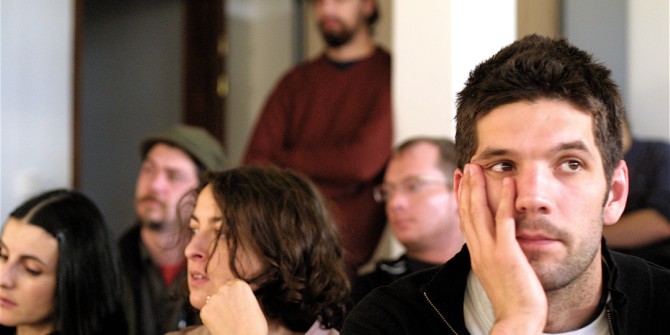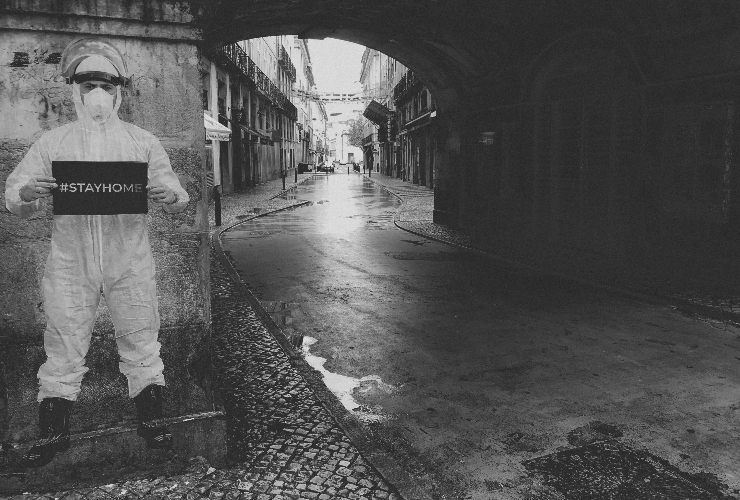The UK strikes in the summer of 2022 interrupt narratives that downplay the reality of worker representation, with the teaching of industrial relations and labour law removed from a range of training and educational spaces. Miguel Martínez Lucio writes that as the collective dimension to work is discounted, individual performance-related systems bypass trade unions, corporate social responsibility gains rhetorical status, and workplaces resort to ‘wellbeing champions’ – who are less concerned with the underlying causes of the health problems they observe.
In this summer of 2022, the current strike wave in the UK has led to many academics and general pundits responding to the nuances and issues raised in terms of the worsening of pay conditions and the importance of worker representation and, especially, trade unions. Academics – and, yes, many of them are still in industrial relations – are studying the nature of work and the changing contours of employment that are reminding the population at large of the significance of the current wave of disputes. Even within the Labour Party – the political organisation formally aligned with the trade union movement – there is a range of internal debates related to how such a new wave of strikes is to be acknowledged and, more particularly, whether a Labour Party politician should be seen in a picket line. There appears to be some sudden reawakening related the sheer breadth of strikes, which recalls instances of other summers in the 1970s when workers mobilised across issues of pay and working conditions.
However, a further issue is emerging regardless of the forms and content of these sudden mobilisations – that, in fact, there is a greater cumulation of events than merely a sudden interruption or exceptional moment. The question of strikes – especially wider strike waves – is one that is interrupting a specific set of narratives that have steadily emerged in various management and policy circles (across the political spectrum) that have downplayed and even repressed the reality of work and worker representation in the UK. The way a sense of panic is gripping not only the government, but also large parts of the political opposition, reflects the fact that questions of industrial relations have, in effect, been either discounted or considered to be something of historical significance yet ironically insignificant to the current world of work.
The idea of industrial relations and trade unionism in decline has been debated for some time, but within the more informed industrial relations circuit these developments have been given nuance by addressing: how new forms of worker organisations are emerging; how the politics of work is extending itself across new frontiers of individual rights; and how conflict remains, but is more subtle or innovative in its development. However, more formal policy narratives – and, broadly speaking, those within management circles – have operated on the basis of workplace conflict being some form of aberration or residue of antiquated industrial behaviour.
Even during the last Labour governments, the industrial future lay in the spaces of business and elite planning rather than engagement with organised labour. This narrative became a self-fulfilling prophecy driven by a desire to subvert the voice of workers. It facilitated the denial of trade unions or worker conflicts as something one needs to consider in terms of their organisational strategies, and also led to a stigmatising of academics and activists engaged with worker representation and industrial relations issues. It led to the curious situation of industrial relations being absent or treated as passé by HRM and management-orientated magazines, yet large swathes of personnel management still embedded in highly unionised settings remained fully aware of the ongoing realities and complexities of tensions and negotiation.
What materialised, building steadily from the 1980s with the emergence of the New Right, was the impact of neo-liberal thinking within large segments of the polity (and within social democratic circles as well). Paralleling this, the emergence of corporate social responsibility as a narrative and practice has been increasingly framed as something best left to management to deliver, which has been the main problem given its increasingly rhetorical status. In the realm of pay, there has been the fascination with the development of individual performance-related systems which have to some extent bypassed trade unions. In terms of health and safety, in place of trade union health and safety representatives, workplaces are increasingly populated by ‘wellbeing champions’ or similar, who are less concerned with the underlying causes of the stress or health problems they observe/deal with. What is more, the removal of the teaching of industrial relations and labour law from a range of training and educational spaces has been actively pursued. The standard range of industrial relations matters – whether pay or other working conditions – have in effect, been steadily individualised and disconnected from the collective dimension of work. This has been shaped by a certain politics of denial within management and large parts of the political establishment regarding the reality of the negative impact of work intensification, state-induced poverty due to austerity, and the ongoing containment of wages and salaries.
The current range of strikes has brought to the fore this naivety regarding work and employment issues amongst large swathes of policy makers and management. Whilst business schools in some cases maintain an interest in the politics and realities of work on the whole, industrial relations scholars keep needing to make it clear that the curriculum cannot assume we have seen the end of unions, collective dynamics in employment or legal aspects of work. The problem we find is not just an inability to acknowledge that conflict is an integral part of the day-to-day nature of work, but also that we have been subjected to an ongoing narrative that has generated institutional hysteria when any industrial conflict takes place.
The extent to which any collective dimension to work has been discounted and even ideologically repressed means that any semblance of rational or partially informed media or policy reflection regarding how to discuss the causes and meaning of industrial conflict seems unlikely. During the current railway strikes, Mick Lynch, the general secretary of the National Union of Rail, Maritime and Transport Workers, has not just relayed his union’s aims in terms of pay and working conditions, but has also depicted the realities of work and the nature of conflict. The union’s counter-narrative has pierced through the politics of denial and organisational dementia (perhaps deliberately stage managed) that prohibits a genuine understanding of the current predicament – generated by years of wage repression and social austerity – in the realities of work.
♣♣♣
Notes:
- The post represents the views of its author(s), not the position of LSE Business Review or the London School of Economics.
- Featured image by Andy F, under a CC-BY-SA 2.0 licence
- When you leave a comment, you’re agreeing to our Comment Policy.






This is a fascinating read, especially regarding the academic study of industrial relations. However, I think that your dismissal of “well-being specialists” does not do justice to the huge development of mental health understanding and support in the workplace, such as Mental Health First Aiders, and the work of organisations such as Mind.